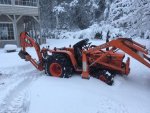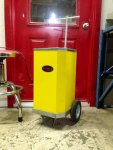KeifferPark
New member
Hello all,
I have a mid-size tractor and excavator that I expect will be the main recipients of my welding attention. I only have a little experience with torch and stick. The metal on the bucket of the tractor is soft, so I'm wondering what the best welding tool/technique would be to use on it for adding chain hooks and repairing cracks.
I have a mid-size tractor and excavator that I expect will be the main recipients of my welding attention. I only have a little experience with torch and stick. The metal on the bucket of the tractor is soft, so I'm wondering what the best welding tool/technique would be to use on it for adding chain hooks and repairing cracks.


